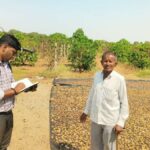Date: 29th May – 3rd June 2025
Location: Siddipet, Telangana
As part of the Farmer Empowerment Program, the Sunyatee International Foundation conducted Phase 2 of the Fact Sheet Survey in Siddipet from May 29 to June 3, 2025. Building upon the insights from Phase 1, this survey focused on identifying evolving trends in Noni farming practices, assessing crop health, and understanding farmer challenges in greater depth.
This phase involved seven dedicated Noni farmers: Parameshwar, Raju, Srinivas, Yadagiri, G. Kalavathi, Manga Padma, and Rajellaiah, all of whom play a significant role in sustaining the organic cultivation ecosystem in the region.

Key Observations from the Field: Phase 2 of the Fact Sheet Survey
1. Soil and Irrigation Practices
All surveyed farmers use red soil and depend on borewell water for irrigation. Farmers like G. Kalavathi, Manga Padma, and Rajellaiah have adopted power sprayers for both spraying and drenching operations, promoting uniform nutrient application.
2. Organic Farming Practices
Across the board, farmers maintain a strong commitment to organic agriculture. Inputs such as cow dung, vermicompost, neem oil, and ecocide are consistently used. Notably, no chemical stimulants or protectants were reported, reaffirming the organic integrity of their farming methods.
3. Yield and Production
- Farmers including Parameshwar, G. Kalavathi, Manga Padma, and Rajellaiah reported yields between 10–15 kg per plant.
- Raju and Yadagiri reported good yields, but experienced issues with smaller fruit sizes (averaging 2–3 inches).
- Srinivas recorded a moderate yield of 8–10 kg per plant.
4. Pest and Disease Challenges
- Green worm and mosquito infestations continue to be widespread and damaging.
- Unlike Phase 1, no fungal or disease-related problems were reported, indicating improved disease resilience in this phase.
5. Overall Crop Health
Most farmers observed stable plant growth, good fruiting, and nutritional balance. However, the recurring issue of small fruit size—especially in Raju and Yadagiri’s farms—requires targeted solutions.

Challenges Identified
- Pest infestations: Green worms and mosquitoes remain the most common and consistent threats.
- Fruit size concerns: Despite proper care, some farmers struggle with producing standard-sized fruits.
- Soil testing gaps: None of the surveyed farmers had conducted soil health assessments, highlighting an opportunity for improvement.
Steps for Lasting Impact
To address the identified gaps, Sunyatee International Foundation is implementing a series of focused interventions:
- ✅ Pest Management Training
Customized, hands-on workshops on managing green worm and mosquito populations through organic pest control strategies. - ✅ Soil Health Assessments
Promoting soil testing and nutrient analysis to support farmers like Raju and Yadagiri in improving fruit size and yield consistency. - ✅ Capacity-Building Programs
Continued training sessions on advanced organic farming techniques and sustainable crop management practices.

Conclusion: Phase 2 of the Fact Sheet Survey
The Phase 2 Fact Sheet Survey sheds light on the resilience, adaptability, and dedication of Noni farmers in Siddipet. While the yields remain strong and organic practices are well-established, addressing pest pressure, fruit quality, and soil nutrition are critical for future success.
At Sunyatee International Foundation, we remain deeply committed to enabling long-term, sustainable farming through science-backed interventions, field-level engagement, and farmer-led development.




